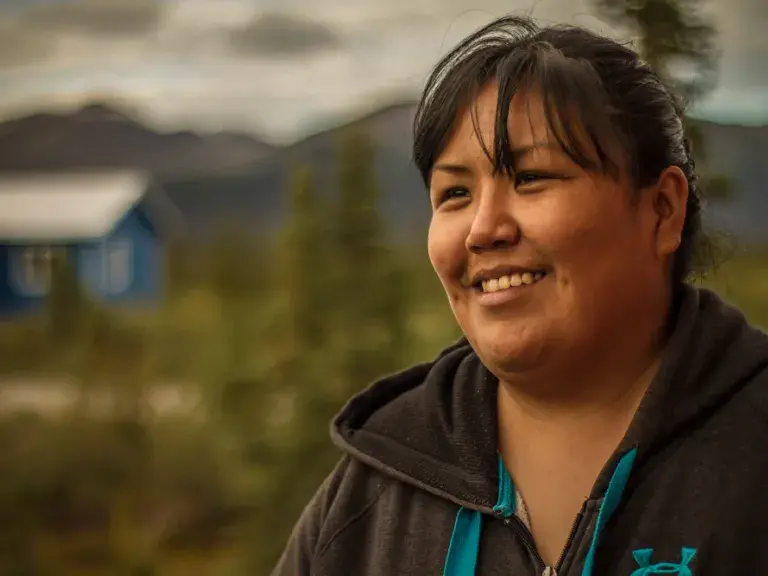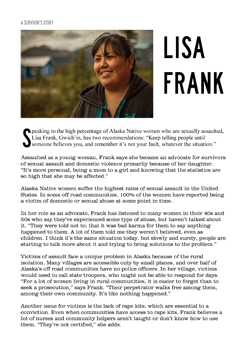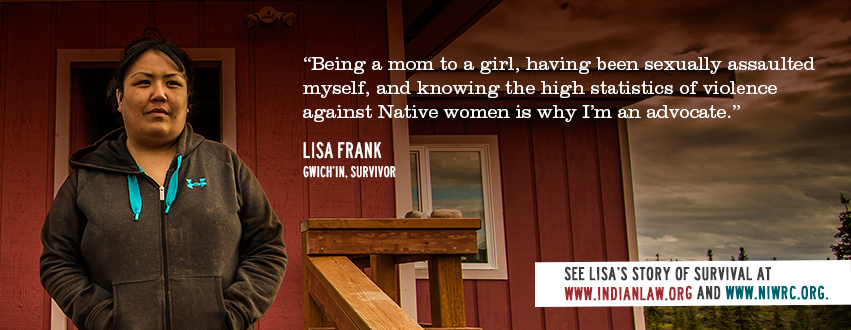
Speaking to the high percentage of Alaska Native women who are sexually assaulted, Lisa Frank, Gwich’in, has two recommendations: “Keep telling people until someone believes you, and remember it’s not your fault, whatever the situation.”
Assaulted as a young woman, Frank says she became an advocate for survivors of sexual assault and domestic violence primarily because of her daughter. “It’s more personal, being a mom to a girl and knowing that the statistics are so high that she may be affected.”_0.jpg) Alaska Native women suffer the highest rates of sexual assault in the United States. In some off road communities, 100% of the women have reported being a victim of domestic or sexual abuse at some point in time.
Alaska Native women suffer the highest rates of sexual assault in the United States. In some off road communities, 100% of the women have reported being a victim of domestic or sexual abuse at some point in time.
In her role as an advocate, Frank has listened to many women in their 40s and 50s who say they’ve experienced some type of abuse, but haven’t talked about it. “They were told not to; that it was bad karma for them to say anything happened to them. A lot of them told me they weren’t believed, even as children. I think it’s the same situation today, but slowly and surely, people are starting to talk more about it and trying to bring solutions to the problem.”
Victims of assault face a unique problem in Alaska because of the rural isolation. Many villages are accessible only by small planes, and over half of Alaska’s off road communities have no police officers. In her village, victims would need to call state troopers, who might not be able to respond for days. “For a lot of women living in rural communities, it is easier to forget than to seek a prosecution,” says Frank. “Their perpetrator walks free among them, among their own community. It’s like nothing happened.”
Another issue for victims is the lack of rape kits, which are essential to a conviction. Even when communities have access to rape kits, Frank believes a lot of nurses and community helpers aren’t taught or don’t know how to use them. “They’re not certified,” she adds.
Frank counts herself “fortunate” because her assault occurred downstate. “I don’t have to worry about seeing the perpetrator walk by me. I don’t have to act like nothing happened. What really did heal me was coming back to my land, just being one with the nature and living among my people, practicing my cultural activities.”
Frank notes that her nomadic ancestors (the Gwich’in are known as the “Caribou People” because of their historical dependence on the migratory species) grew strong in their daily efforts to survive. “That strength runs in my blood. I take pride in that. This land has healing powers, especially with the Caribou. It’s just like food for the soul.”
LISA FRANK, Gwich’in from Alaska, finds strength from her Native culture to speak up for women who have been the victims of sexual assault and domestic abuse. Assaulted years earlier as a college student, she now works to make sure Native women, including her own daughter, are safe in Alaska, where a Native woman is assaulted every 18 hours.
DOWNLOADS
| Video | Download the mp4 file | ||
| Story & Bio |  | ||
| Poster | _0.jpg) | ||
| Facebook banner |  | ||
|
| ||
